“I look at my yesterdays for months past, and find them as good a lot of yesterdays as anybody might want. I sit there in the firelight and see them all. The hours that made them were good, and so were the moments that made the hours. I have had responsibilities and work, dangers and pleasure, good friends, and a world without walls to live in.” — Beryl Markham, West with the Night
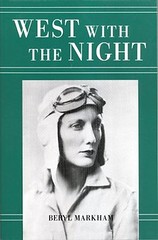 West with the Night
West with the Night
Beryl Markham
![]()
No review of Beryl Markham’s memoir is complete without Ernest Hemingway’s endorsement:
“Did you read Beryl Markham’s book, West with the Night? I knew her fairly well in Africa and never would have suspected that she could and would put pen to paper except to write in her flyer’s log book. As it is, she has written so well, and marvelously well, that I was completely ashamed of myself as a writer. I felt that I was simply a carpenter with words, picking up whatever was furnished on the job and nailing them together and sometimes making an okay pig pen. But this girl, who is to my knowledge very unpleasant and we might even say a high-grade bitch, can write rings around all of us who consider ourselves writers. The only parts of it that I know about personally, on account of having been there at the time and heard the other people’s stories, are absolutely true . . . I wish you would get it and read it because it is really a bloody wonderful book.”
Did you notice I took the trouble to look up the full quotation? You can probably guess which part of it is normally left out. Beryl may well have been unpleasant and bitchy to Ernest, but I defy you to read her book and not wish you could go back in time to meet her.
Yes, the writing is marvelous, bringing to life British colonial society in East Africa, back in a time when much of the continent was still uncharted, its wildlife abundant and as yet unthreatened. The colonial artificiality of monied white people employing native Africans in menial roles is ever-present in Beryl’s narrative, paradoxically so taken for granted it does not unduly offend modern readers, especially since Beryl herself had close and friendly personal relations with the Africans she grew up with.
And what a growing up it must have been! Mauled by lions, attacked by horses, abandoned by her mother as a small girl and then by her father as a teenager, this self-possessed, headstrong, largely self-educated young woman made her own way in British East Africa, first as a horse trainer and then as an aviator and bush pilot. Her memoir flows naturally, starting with a description of a flight into the African bush to deliver an oxygen tank to a mining camp where someone is gravely ill; then to the search for and eventual rescue of a downed aviator who had been missing for several days. Along the way she encounters a lion, which leads her to describe her near-fatal experience with another lion when she was a small girl; she lands at a farm, leading her to describe farm life and the training of race horses; she meets an old Indian peddler in the bush, leading her to describe the Indian syces, African servants, and Masai tribesmen she learned from; all leading to the time she met the man who taught her to fly … well, as I say, it flows naturally and beautifully, and anyone contemplating writing a memoir would do well to study this one.
I could not care less about farm life and horses, yet I read those chapters of her memoir with the same delight I felt reading her chapters about aviation. I learned what it was like to live as a British colonial in what is now Kenya; I learned what it was like to fly from Africa through Italian-occupied Ethiopia and Libya during the days of fascism and Il Duce; I learned what it was like to scout game from the air for white hunters on safari; I learned what it must have been like to be a member of white British society in colonial times, the good and the bad.
I do not fault Beryl Markham for being unreflective on the colonization of British East Africa and the servant/master relationship between native people and white colonials. She was an astute observer, though, and her “this is how it was” descriptions of life on the farm and in Nairobi tell you what it was like, without editorializing. Some reviewers seem disappointed in Beryl for omitting her love life from this memoir. But I say it’s her memoir, and you can look all that stuff up anyway. And I did. And that too is fascinating. What a remarkable person she was!
I’m with Hemingway. West with the Night is a bloody wonderful book.
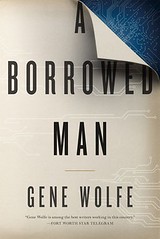 A Borrowed Man
A Borrowed Man
Gene Wolfe
![]()
My first experience of Gene Wolfe was reading his brilliant 1972 novella The Fifth Head of Cerberus. As I recall, the narrator was a young man who had been raised in, and still lived in, a brothel on another planet. I was struck by Wolfe’s world-building. The narrator didn’t explain his world; rather, he showed the reader its customs and functions in context: it was up to the reader to come to an understanding. This approach to world-building is what stayed with me, and over the years I’ve returned to Gene Wolfe again and again.
A Borrowed Man reminds me of Wolfe’s early novella. The narrator, this time, is a recloned mystery writer who lives on a shelf in a library, available for consultation and borrowing. Once again, there’s a world to be built—that of a future Earth where the population has been drastically reduced (we don’t know how this came to be, but it must have been cataclysmic), a civilization still beset by problems (a great disparity between wealth and poverty, for one)—and it’s up to us to figure this new world out from information incidentally revealed by the narrator.
To me, A Borrowed Man read like a “closed room” murder mystery with science fiction elements. The narrator’s persona, the way he writes and speaks, is that of a 20th Century mystery writer. The action occurs, not in a literal closed room, but in two or three connected locations, and the cast of characters is limited. As in many mysteries, you can count on the various characters—most definitely including the narrator—to withhold key facts, to misrepresent motives, to lie.
At bottom, the mystery is not too complex, although it does involve a portal to a parallel universe. As I read, I was constantly mindful that in a closed room mystery every detail has meaning. But for the life of me I could not see how some of the details in A Borrowed Man contributed to my or the narrator’s understanding of the crime at the heart of the story. Did interviewing and hiring Colette’s former maid help Smithe figure anything out? What purpose was served by sending Chick to the local library to check out a reclone of Smithe’s former wife, the poet Arabella? The thought that I simply don’t grasp what Wolfe is revealing with these details is disturbing. The thought that these details are filler and do not in fact contribute to solving the mystery is even more disturbing.
The subplot involving the recloning of deceased authors is interesting, but also somewhat outside of and incidental to the central mystery. Still, it’s a welcome detour down a speculative path. What is a reclone, as opposed to a clone, by the way? This, in Gene Wolfe fashion, is never explained; I think what he means by recloning is the production of several duplicate bodies using the original author’s DNA, each with implanted memories based on written and digital records of that author’s life and work. As we see with the reclone Smithe, such memories can be vague and incomplete; he does not, for example, initially recall writing the mystery that prompted Colette to check him out from the library in the first place. As mentioned, there are several Smithes (and several Arabellas) in various libraries across the land, each an individual human being (though not in any legal sense).
Well, whatever … this reclone has a mind of his own, a sharp and devious one. There’s pleasure to be had watching him evolve into a person quite different from the original Smithe, though the odd and seemingly-unconnected details I mentioned earlier dulled my pleasure. This is good Wolfe, but not the Wolfe of The Fifth Head of Cerberus.
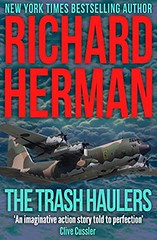 The Trash Haulers
The Trash Haulers
Richard Herman
![]()
I think this may be the first Dick Herman air war book I’ve read that takes place during a historical war, not a hypothetical one. The war is Vietnam, and the action centers on tactical airlift and helicopter operations during North Vietnam’s 1968 Tet Offensive.
As always, it’s an exciting story, and the pages fly by. I read it in two sittings and was ready for more. Herman’s “can do” flyboys come to life. Side characters are equally well drawn, likable and unlikable alike. Herman’s theme here is living up to honor and duty, with a strong emphasis on ingenuity in the face of adversity … embodied in the phrase “flexibility is the key to air power.” It’s never hard to tell Herman’s good guys and gals from the bad ones, but he can be subtle, too, and sometimes the characters you’re meant to hate will surprise you. In any case, his stories are always engaging, and this one is no exception. In fact, it’s hair-raising, suspenseful and full of twists. I was practically panting by the end.
I’ve read and enjoyed all Herman’s novels. I should note that Dick and I used to fly together, and have maintained a close friendship. I don’t think my reviews of his books are affected by our friendship, however. I’m probably harder on him than I would be with authors I don’t know.
My only negative comment on The Trash Haulers likely applies to all of Herman’s air war novels, as well as to the military techno-thrillers of Tom Clancy, Dale Brown, et al: these authors must jump through narrative hoops to explain and spell out military concepts, terminology, and acronyms, especially during opening chapters when unfamiliar concepts and terms are introduced. Yes, many readers need to have these things spelled out, but it makes for awkward reading if you know the subject.
Dick does better than most at keeping explanations out of the dialog, and I appreciate that. Some authors would simply have a character say “The colonel is attached to MACV, which is pronounced ‘mac-vee’ and stands for Military Assistance Command, Vietnam.” Dick knows no human would ever say such a thing, and he doesn’t force characters to speak unnaturally. Instead, he steps in as omniscient narrator to explain terms and acronyms. Still awkward, though, and I wish it didn’t need to be done.
In spite of that quibble, The Trash Haulers is a good, exciting read. Dick knows a hell of a lot about Vietnam, since he was there, and I think there’s more to come.
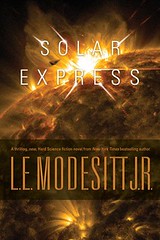 Solar Express
Solar Express
L.E. Modesitt Jr
![]()
Tor Books asked if I would read and review this new science fiction novel, and after reading the synopsis I agreed. Though the author, L.E. Modesitt Jr, is new to me, I am a fan of hard SF and his novel did not disappoint.
As I read Solar Express, I thought often of Arthur C. Clarke’s Rendezvous with Rama novels, and of Andy Wier’s The Martain. Rama in that Modesitt describes an enounter with an alien artifact, The Martian in his strong focus on astrophysics, engineering, and human pluck.
The action in Solar Express occurs in a near future dominated by a few regional world and space powers. The top dogs are the Sinese and Indians, who are threatening to weaponize their space assets and are on the verge of declaring war on one another. Noram, a geopolitical entity composed of an ecologically and economically damaged USA and Canada, is still a major power, and is directly affected by the actions of the Sinese and Indians.
The main characters are citizens of Noram. Dr Alayna Wong-Grant is a post-doctorate astrophysicist on a solo posting to a remote observatory on the dark side of the moon. Capt Chris Tavoian is the shuttle pilot who ferried Alayna from the Noram space elevator to her lunar outpost, striking up a friendship with her on the way. Their friendship and eventual romance forms the major part of the novel’s structure, which is built around their exchange of messages.
Alayna detects a heretofore-unknown comet on an inbound trajectory toward the sun. Chris is meanwhile diverted from his civilian shuttle duties to a secret Noram military space installation. Alayna’s comet gradually resolves into an alien artifact, and Noram drafts Chris to fly a daring solo mission to intercept the object, now known as the Solar Express, and explore it during its approach to the sun.
Space opera ensues. There’s the growing romance between Alayna and Chris; the threat of war between the Sinese and Indians, a threat that includes the imminent destruction of Noram’s space installations and ships; the spooky and initially incomprehensible alien artifact and its strange interaction with our sun as it accelerates toward it; and some hard (to me, at any rate) scientific speculation about physics. The background details of Modesitt’s near-future world, conveyed through news bulletins, personal letters, and bureaucratic messages forwarded to Alayna and Chris, are interesting and believable.
I thought parts of the narrative were repetitive and tended to unnecessarily draw out the action (how many times does Chris have to experience being pushed back in his seat by his ship’s acceleration before we get the idea?), and I downgraded my star rating accordingly. But that is not to say Solar Express isn’t exciting and interesting: I couldn’t stop turning pages. What seemed at first a very long novel—448 pages in the hard-bound edition—turned out to be a quick and enthralling read.
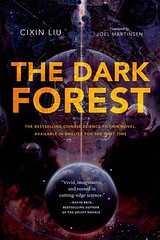 The Dark Forest (Three Body #2)
The Dark Forest (Three Body #2)
Cixin Liu
![]()
This is the second book of a trilogy by Chinese science-fiction author Cixin Liu. To read my review of the first book, The Three-Body Problem, click here.
The second novel picks up where the first left off, then advances approximately 200 years into the future, to a time when the Trisolarian fleet is approximately halfway between its planet and ours.
In my earlier review, I compared the science fiction of Cixin Liu to that of Isaac Asimov. When I did so, I was thinking of The Foundation Trilogy. In the second book, I was happy to see the author reference Asimov and Foundation, as well he should.
I read the second novel with the same enthusiasm I brought to the first, but was not as star-struck this time around, hence a slightly lower rating. I thought the characters were better drawn in the first novel than in the second; also, I found myself more questioning of the author’s scientific and plotting assumptions this time around; specifically the nature and behavior of an advanced probe sent to our solar system by the Trisolarians, and the deus ex machina of hibernation technology.
But all this is a matter of degree. I liked The Dark Forest only slightly less than The Three-Body Problem, which is to say I liked it a lot, in spite of it being a much darker novel than the first: Cixin Liu literally compares the universe to a dark forest, wherein lone hunters hide from, and prepare to kill, other hunters. The iron rule of survival, bound by chains of suspicion, govern the play of civilizations.
Nevertheless, there is an interesting and encouraging twist at the end, and I have placed an advanced order for the third book of the trilogy, Death’s End, which will be released in English in August 2016.
Books I Didn’t Finish Reading
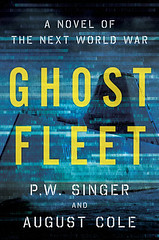 Ghost Fleet: A Novel of the Next World War
Ghost Fleet: A Novel of the Next World War
P.W. Singer & August Cole
![]()
No rating.
Not really a novel, it seems more an attempt to alarm complacent Americans about the possible uses of emerging technology in a war between China and the United States.
Basically, China, allied somehow with Russia, Pearl Harbors us—in space, on the ground, and at sea (including, literally, Pearl Harbor). The authors attempt to humanize the narrative with recurring characters, but they’re not really trying: the heart of every chapter is a technical description of another bit of technology, and how it may be bent into warlike purposes, and boy we’d better keep our guard up against the Yellow Peril.
One Goodreads reviewer comments that the book comes across as the product of a neocon think tank. Others describe it as second- or third-rate Tom Clancy. Based on what I read, yeah, pretty much.
Markham’s book is simply put, brilliant. A lot of people were bitchy to Hemingway and he was bitchy to a lot of people. No worries.